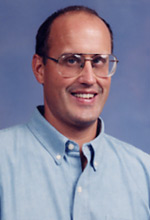September 256, 1999 - What would make a distinguished physicist, a widely-published theologian, a man recently knighted by Queen Elizabeth, spend five weeks living out of a college campus apartment across the ocean from his home?
 Throughout
his distinguished dual career as a theologian and scientist, Rev. John Polkinghorne has
always thought deeply on issues of science and Christianity. He has published many works on the topic: I particularly enjoyed
Scientists as Theologians and Faith of a Physicist. Now officially retired, Polkinghorne is in constant demand as a speaker
and writer. Last summer he accepted a call to live among a small group of scholars.
Throughout
his distinguished dual career as a theologian and scientist, Rev. John Polkinghorne has
always thought deeply on issues of science and Christianity. He has published many works on the topic: I particularly enjoyed
Scientists as Theologians and Faith of a Physicist. Now officially retired, Polkinghorne is in constant demand as a speaker
and writer. Last summer he accepted a call to live among a small group of scholars.
For the Calvin College Faculty Summer Seminar in Grand Rapids, Mich. entitled "Theology and the New Physics," Polkinghorne mentored 15 Christian scholars from around the country who all wrote proposals on the interface of physics and religion. I was one of those accepted; it was the most intellectually fruitful period of my life. Among us were about a half dozen physicists, a half dozen philosophers of science, a Lutheran theologian, an English professor working with his physicist son, and a biophysicist - me.
Polkinghorne spent a long and successful career as a mathematical physicist studying elementary particles - tiny bits of matter like quarks and other subatomic particles. In 1979 he was called to the ministry, left Cambridge University, and a few years later was ordained in the Church of England as a parish priest. Little did he know then that he would one day again be part of the community of scholars at Cambridge as president of Queens' College, an office he held from 1989 - 96.
For the first week, we had intense lectures and discussions on topics in modern physics arcane to many: quantum mechanics, relativity, time, cosmology and chaos theory. Then Polkinghorne stirred things up with lectures on Christian doctrine, from an Anglican point of view: scripture and revelation, philosophy of science, theodicy (God's role in a world full of evil), metaphysics, Christology and more.
The capstone of the experience was Polkinghorne's public lecture, "Can a Scientist Pray?," in which he demonstrated how advances in modern physics help us understand the actions of a sovereign God. The lecture displayed a Cambridge don at his best; Polkinghorne's talk was a tour-de-force of sharp insight into theology, physics and philosophy. You didn't have to agree with every point of his theology to be blessed by the lecture.
Learning is never passive, but even so we were not there merely to soak up lecture and chat in an undirected stream-of-consciousness sense. We each performed our own research. Mine pertains to the biophysical basis of human emotion. Little snippets of proteins, or peptides, in our bodies are involved in our emotional responses. One of these, neuropeptide Y, helps modulate the level of anxiety we feel, among other things. I am studying this molecule to see if I can understand how it and others like it can actually be part of the control mechanism for our emotions. In my research, I've had to ask, what is the biophysical basis of this peptide's activity? Can we really reduce emotion to just molecular action, as Francis Crick insists? How is emotion a constituent of the imago Dei in every human being?
We at Union University actively integrate faith and discipline in our teaching and scholarship. The seminar proved to be a gold mine of ideas for all my classes, and I have already incorporated many of them in the classroom, especially in my Introduction to Physics survey. My students spend some time all semester contemplating not only their role as Christians in the scientific workplace and in academia but also the awesome beauty of the Lord's role in every aspect of every scientific endeavor.
By God's grace, we need hearts enlightened by the Lord Jesus Christ to fully understand reality (Romans 1; Ephesians 1). I hope my students come to understand that science is "an invented cultural institution, . . . not present in all societies, and not one that may be counted upon to arise from human instinct," as Loren Eisley wrote in "The Soul of Science."
We must work hard to understand the truths of science, whether of creation or of human emotion or of quantum mechanics. The field of science is full of those who work hard in their own strength, for their own glory or in the interest of contemplating an awesome but impersonal universe. At Union, we strive to challenge our students to consider how they can glorify God by having the special revelation of saved hearts to inform our scientific endeavor.
Polkinghorne has integrated science and faith on a high level, as an eminent scientist and as an ordained Anglican priest. How will Union's science students witness to the world that "The heavens are telling of the glory of God; and their expanse is declaring the work of His hands?" (Psalms 19:1) We faculty stand ready to prepare them for the task.
Rev. John Polkinghorne’s lecture, “Can a scientist pray?” is available on video at the Emma Watters Summar Library at Union University. For more information on Dr. Glenn Marsch's work and on science and faith issues in general, visit his web site at http://members.aol.com/drgmarsch/.


